This post may contain affiliate links.
This post is going to be very real, and it may draw some criticism, but this is our journey. We bought our 5 acre farm property (homestead, if you prefer that term) just over 2 years ago now, we acquired a whole bunch of animals, grew a whole bunch of food and it’s been great, but we made mistakes and it cost lives. We’re still making mistakes, constantly. I hope somebody, somewhere, finds this post about tropical homestead mistakes and pitfalls useful.

Upfront, I’ll say that we wouldn’t swap this lifestyle for anything (currently- we may go back to travel in future). It’s hard, it’s dirty, and it can be frustrating. But it’s so much better than the old suburban life. That suburban life was one of the reasons we left to travel back in 2012, I hated it!

Feeding your family good food, not from the store, packed with nutrients and not packed with chemicals, is hard to beat. Seeing the animals, picking fruit or veg, just going outside, makes us smile. The pure joy of new hatches and births is ongoing and regular.

We love it, but we also love travel and combining the two is hard, but not impossible. I’ve been to a dozen countries since buying the farm. This life is cheaper, hands down, and being more eco-friendly and sustainable is important to us. It’s great for the kids too, a whole new set of experiences for them and new skills to aquire.
Mistake 1, Not Considering The Different Climate

While our new home in the country is just a 40-minute drive from our old suburban home, it’s at the same latitude, about 16 degrees south of the equator, the climate is different.
We’re at 400m elevation, a small hill, but it makes a world of difference to our growing conditions and our living environment.

It gets cold in winter, so everything I previously wrote about growing food in the tropics, and everything I knew about growing food in the tropics, really needs an overhaul.
Winter here is too cold for most of the food plants we considered perennial in our garden at sea level.
Chillies stop producing in winter, where previously we had chillies year-round. Cucumbers do better here. We can grow more traditional “winter” veg. The cucamelons shut up shop in late autumn. Things are just different, and we’ve had to adapt. We need to preserve some things, even eggs, there is seasonality. Right now, from 60 birds, we’re getting 2-3 eggs per day. In spring it’s a dozen or more daily.
I’ll share some of those preservation recipes in time. We don’t can, we barely dehydrate because of the humidity, but we do ferment, pickle, and make jams. We freeze lemons, that’s easy! I’ll be picking lemons this week, March. But last year it was February, we had a very wet wet season.
I can’t grow tomatoes here. They used to thrive at sea level, but up here the nematodes and bacterial wilt kill them off. I’m working on it, I’ll figure it out in time.
While the tropical fruits we grow remain the same, and citrus and passionfruit grow really well, there is more defined seasonality, and things are just that little bit different.
Honestly, we’re still getting used to it. Spending time observing the land, water levels, the path of the sun over the year, the pests that come and go, the wildlife, it’s all really important in getting used to growing food on a property that’s new to you.
Winters are cold and we’re often in the clouds. It gets damper than at sea level. We get mold. For the first time in my life, I bought a tumble dryer. I’ve never needed one before but here in the clouds, we need it. Stuff doesn’t dry. It runs off the solar, so we only run devices like that when the sun is shining.

We need heating in the house in winter and we break out the sweaters, I love that! But the tropical plants don’t.
Summers are a little cooler, usually about 5 degrees C cooler than on the coast. I love that too, but it’s less “tropical”.
Mistake 2. Underestimating Cyclones
For the first time in almost 20 years living in the tropics, we got hit hard by a cyclonic weather system. The cyclone itself wasn’t too bad, no high winds, we had a couple of trees come down, but nothing too serious. But over the next 4-5 days the ex-tropical-cyclone dumped so much water on us that everything ground to a halt.
We had no power, phone or internet for 8 days, we couldn’t get out in a car. We ran out of a lot of essential things.
The biggest problem was animal food and bedding. We never imagined we’d be unable to get to a feed store for over a week, nor that when we got there, the shelves would be bare.
We got through it, we managed. But we learned an important lesson, we always need a big stock of food and bedding. Because you never know what’s around the corner.
Moving forward, I’m growing a lot more animal feed (Pigeon peas are great for this and they grow well, pulses for the chickens, plus edible feed for the sheep and goats.)
The cyclone also killed just about everything in my vegetable garden and 3 papaya trees. We learned, the hard way, how the water flows on our property. More ditches will help.
We had enough food for the humans, that was fine, I keep a bit of a prepper pantry being so far from the shops, but we need more fuel for the generator. Something else we need a store of.
We check our generator is working often. That’s something you must do. Our neighbours went to start theirs and it was broken. Then they couldn’t get to the shops to buy one for days. Keep your gennie working!
Also make friends with your neighbours and check on each other, that’s vital in an area where natural disasters happen. It’s great for the boys to look after our elderly neighbour too. There are life lessons there.
Mistake 3. Underestimating The Local Wildlife
Suburbia and the country are not even close to the same thing when it comes to wildlife.

Predators we’ve faced in the rural tropics include snakes, monitor lizards and birds of prey. Giant white tailed rats (that chew through electrics) and all manner of kangaroo/wallaby marsupials are also a feature. They eat my veggies. Kingfishes (including kookaburras) are also predators, they eat my fish and could take a chick or keet. But they’re so pretty!
We don’t have foxes here (thankfully) but there is a possibility of dingoes and stray dogs. Both can kill sheep.
We have poultry, guinea pigs, plus baby lambs and kids. We could lose any small animal to predators, and we have.
On the plus side we have incredible birds, beautiful butterflies, green tree frogs and the hoppy critters are cool if they don’t eat my veggies.
Despite our best efforts, snakes (pythons) take chickens and guinea fowl fairly often. They’ve also taken a fully adult goose. We never thought that would happen.
Our coops for chickens, geese, ducks, turkeys, guinea fowl, and peacocks, are snake-proof, we thought, but every now and then the pythons find a way to take a bird. They’ve even gone into coops in daylight, but mostly the danger is at night.
It’s sickening when you find that you’ve allowed a snake to take a pet. And they are pets really, we love all of our animals. Losing our female goose was horrific, we were devastated. We keep our geese in a snake-proof pen at night now.
Mistake 4. Being Too Slow Becoming Vets
When you keep animals, you become your own vet. We’ve vaccinated and wormed, treated wounds and infections. In future we will have to castrate, de-horn, maybe help with difficult deliveries. It’s a lot and we’ve made mistakes.
We have pregnant goats and sheep right now. I’m praying for easy births, but at the same time, learning how to deliver if they run into difficulties.
You learn from your mistakes as well as intentionally studying and 2 years in, we know a lot more than when we started.
Honestly, I could write a book on this topic, and maybe I will create more posts. But our biggest mistake was in worming with feed store wormer. We lost a lamb. She had been wormed just weeks before, but the feed store stuff was useless. The vet (over an hour away) sorted us out and we now know what to do and when.
Buying livestock is also a danger zone. We bought sick animals. But we dealt with that and those animals, that came from a disgustingly cruel environment, are happy and healthy now.
Every day we learn more. I’m from a human medical background, I know a lot, but the learning curve with livestock is incredibly steep.
More Mistakes on a Tropical Homestead

I could go on forever, but you don’t want to read all day. If you have any questions, put them in the comments and I’ll be back with more stories of successes and failures soon. Thanks for being here.
As I am a full-time blogger, I’m home, nobody in the family works more than part-time, there’s always somebody home. If you have full-time jobs or need to make a profit from the land, I don’t know how you’d do that. Having adult kids is gold, they’re getting good with animals, fencing and all manner of new skills. There’s no danger of us being empty nesters any time soon. The kids are happy.

Simple things you could do for profit, like selling farm gate eggs and excess produce, are made impossible by local laws and insurance requirements in Australia. You either need to go all in and set yourself up as a business, or like us, just do it for yourselves and gift eggs and fruit to friends.
Sometimes we barter eggs for pumpkins, that sort of thing. There is a local network of swaps and exchanges and that’s precious.
We have harvested chickens and a sheep is going in the freezer soon with help from neighbours and our local butcher. We’re getting there, in future we’ll get better set up, maybe start selling produce once we know it’s sustainable and worth paying the insurance.
I can’t cross-post this site to World Travel Family followers, I did this time, but I probably won’t again. If you’d like to be notified of updates to this site, sign up to follow. There should be a spotlight subscribe form further up the page. I started this blog as a gardening site in the dark days of lockdown. I’ve been gardening since I was a toddler alongside my dad. I didn’t know back then that we’d be buying the farm. But we did. And here we are.
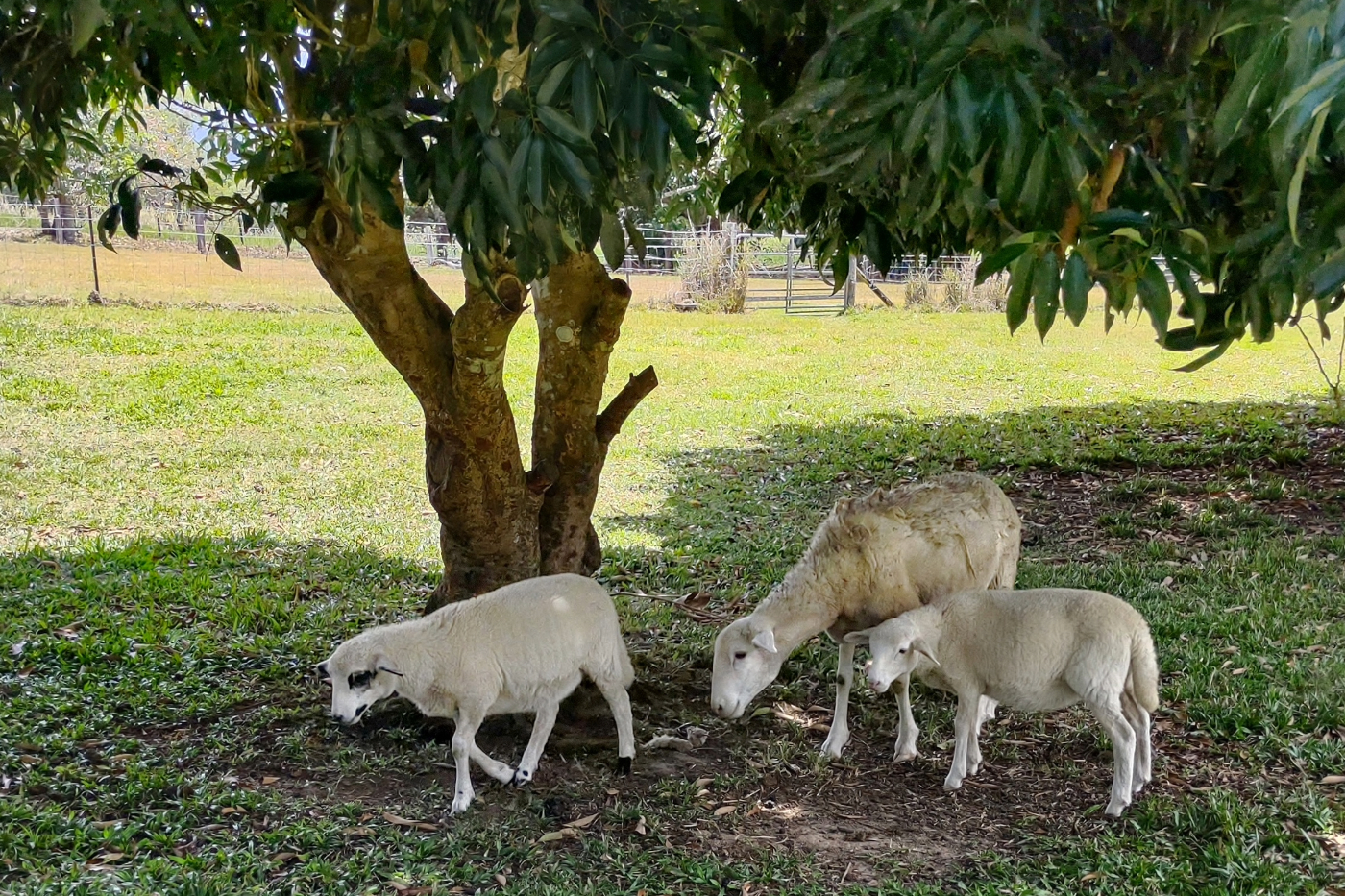
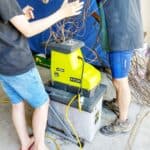


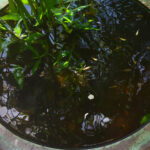
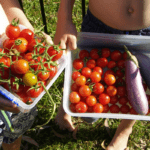
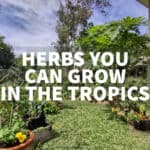
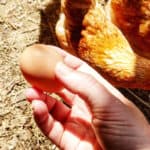
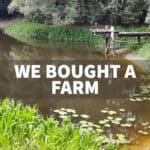
That was a fabulous and informative read as always Alyson.
You continue to inspire me.
In the meantime we enjoy our rented home but on acreage too and I love pottering in the garden when I get the chance. I LOVE chickens but we don’t have any for now.
Maybe you could right about the cost of animal husbandry. Where you look for your animals – are they all rescues? That eats into the vet bills and medical supplies but still, a rescue is worth it. Or once you have a pair or two, then you just let the breeding naturally run its course ?
You work so hard to make the life you want – swings and roundabouts always with climate and weather and location etc. but you make the most of it all. Love your work – always have – always will.
Thanks Kym, great ideas, keep them coming!
Loved your post. I grew up on a farm.
In Saskatchewan Canada. We had cattle for our own beef and milk and to sell. Pigs. Chickens. And mostly grain farming. Wheat, canola, flax, barley. We did not have your predators to hunt down our animals except odd chicken getting caught by a coyote or fox but always had a dog to help with that.
We had porcupines and skunks come around too.
We always had very healthy food and of course a huge vegetable garden.
So much work but we had “real” food to eat.
Later my husband and I lived in the country and had huge vegetable gardens. Easily as climate very good for potatoes, corn, tomatoes, all lettuces, peas, cabbages, carrots, turnips, cucumbers and so much more.
It’s hard work but rewarding. It’s a great experience for your boys.
Look forward to more of your posts. So interesting to read how different it is where you are living to raise animals and to garden. Thanks for this post.
Thank you so much Carol. You just made my day! I’m a bit at a loss, not sure what to write about here. There’s so much. Plus I’m struggling to keep the travel sites afloat, and look after the animals / gardens / cook / train for a marathon/ refurb/ clean – you know how it goes! I will try my best. And thanks for sharing. I have a friend from Saskatoon, I met him in Bhutan – sounds a bit chilly!
It’s incredible how much you’ve learned in such a short time. Mistakes are part of the process, and it’s clear you’re committed to growing sustainably. Much like nurturing your land and animals, tree care in the UK helps restore biodiversity and creates a healthier environment for future generations. Your story is a great reminder of how we all can contribute to positive environmental change!